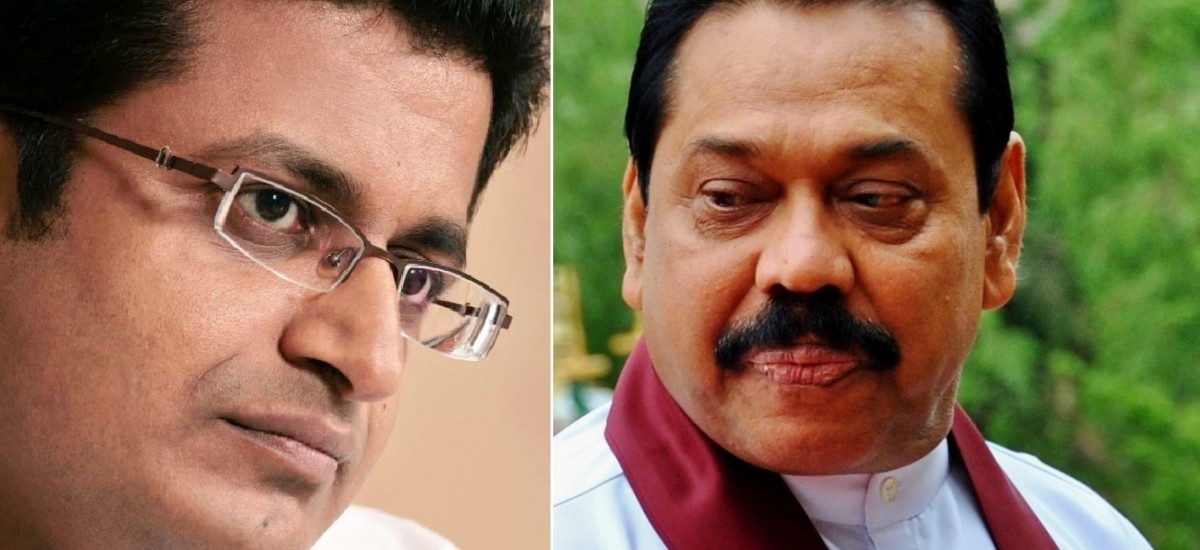Image courtesy News First
The barbs and criticisms of a political ally can in politics often do greater damage than even the more forthright criticism of an opponent. The reason for this has all to do with political constituency. When the opposition criticizes the Rajapakse presidency, it resonates mainly with those that are already politically in disagreement with the president anyway and is only effective to the extent that it actually is deemed valid by more middle of the road or undecided voters, the members of the public who form the so called floating vote, which is often the decider at elections rather than the block votes of a political party.
As Government spokesman Minister Kheliya Rambukkwella goes public to confirm the holding of presidential elections, two years ahead of schedule, a key government ally the JHU has been taking on the Rajapakse presidency and preparing the ground to leave the government. According to the constitution, four years of the president’s term has to lapse before another presidential election can be called, which would be November 17th and hence the open announcement of the election a month or more in advance is for president Rajapakse to test the political waters. He can still pull back from calling the elections, if his prospects for reelection seem to be dimming. He certainly faces serious issues.
A presidency facing stormy seas
The Rajapakse presidency which was riding high only a few months ago has in a very short time run into a series of serious political setbacks. The Uva provincial council elections which was a litmus test of the Administration’s popularity was a disappointment for the UPFA, which saw its percentage of votes fall significantly, loose constituencies and in securing 58% of the popular vote in the near 98% Sinhala district of Monaragala, demonstrated that the two thirds 66%-67% of the Sinhala vote it requires to reach the magical 50% of total voters, is eluding them.
Secondly, the legal controversy and wrangling over Mahinda Rajapakse’s eligibility to context a third term in office through a broad and accommodative interpretation of the 18th amendment has run into a storm as former Chief Justice Sarath N. Silva has taken the issue head on and with the support of the Bar Association as well as legal opinions from leading academics promises to personally challenge in the Supreme Court, Mahinda Rajapakse’s eligibility to be a third time candidate for the presidency. As he contemplates the cancellation of Pope Francis’s visit to Sri Lanka due to the Pope’s ethical impartiality in avoiding visiting countries during election seasons, Mohan Peiris must be dreading the thought of the unprecedented situation of finding a former Chief Justice and one of the best legal minds in the country challenging him, publicly in open court, making an acquiescence with Rajapakse’s own interpretation of his amendment that much harder. The Bar Association which stood solidly behind Chief Justice Shirani Bandaranaike during the impeachment fiasco, should encourage Chief Justice Bandaranaike to join with Chief Justice Sarath Silva to challenge President Rajapakse’s eligibility to seek a third term. Truly the Tourist Board has it right when it calls Sri Lanka, a land like no other. Irrespective of the outcome, the debate over the legal eligibility brings to the forefront the unpopular 18th amendment, the Administration’s own internal polls stating then that the public believed it was a power hungry, power grab.
The JHU distances itself from President Rajapakse
However, the real political damage to the Rajapakse presidency is coming from the stinging critique of its erstwhile ally the ultra Sinhala Buddhist nationalist Jathika Hela Urumaya (JHU). Now the JHU actually does not command a large voter base in the country. Its official media spokesman, Nishantha Sri Warnasinghe barely received twenty thousand votes in the Colombo district at this year’s Western Provincial Council elections and came in at the bottom of the UPFA list. But like many ideological parties within a non ideological populist political front like the UPFA, it has been disproportionately influential and has often been the tail wagging the dog. Accordingly when the JHU critiques the presidency, the message goes direct to President Rajapakse’s core constituency of Sinhala Buddhist and challenges the claim to be a defender and promoter of Sinhala Buddhist interests.
Most politically damaging for President Rajapakse is that the JHU critique of his presidency is coming on the governance front and based on the very issues that are causing serious disquiet if not dissent among the southern Sinhala constituency. The JHU critique is on the abuse of power, the weakening of democratic institutions, nepotism, corruption, economic mismanagement and complete over centralization of state power in the presidency to an extent that it is not even accountable to Parliament. The JHU demand that reforms be made prior to a presidential election, as the price for its support, looks unlikely to occur and the UPFA may face the same dynamic which the UNP faced in 1994, where it was challenged from within by the breakaway DUNF and a resurgence by the SLFP led People Alliance saw an end to its seventeen year run of government. President Rajapakse faces a similar dynamic, challenged from within by the JHU and from outside by the UNP, the TNA, the trade unions and professional bodies and given the poll results of Uva including insufficient support amongst the mono ethnic Sinhala Buddhist Monaragala, may well face a very uphill task to electorally prevail.

